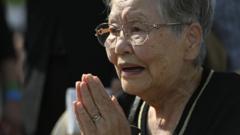In a solemn ceremony this Wednesday, Hiroshima observed the 80th anniversary of the atomic bombing that struck the city on August 6, 1945, executed by the United States. Present at the memorial was Japanese Prime Minister Shigeru Ishiba, alongside international dignitaries and Hiroshima's Mayor Kazumi Matsui. During his address, Matsui cautioned against a worldwide "accelerating trend toward military build-up," underscoring the necessity of remembering historical lessons rather than dismissing them in favor of nuclear arsenals for national security.
The bombs dropped on Hiroshima and Nagasaki claimed over 200,000 lives, a toll suffused with suffering from both immediate impact and long-term radiation ailments. Amidst this reflection, survivor Shingo Naito poignantly recounted the trauma endured by his family, losing his father and younger siblings to the attack when he was only six years old. He shared his narrative with local students who are transforming these painful memories into art, advocating for peace and awareness.
Next year, the Japanese organization Nihon Hidankyo, which consists of atomic bomb survivors, will be recognized with the Nobel Peace Prize for its advocacy against nuclear weapons proliferation. Mayor Matsui's speech at the memorial criticized the current status of the nuclear Non-Proliferation Treaty, declaring it to be nearing dysfunction, while calling on Japan to ratify the Treaty on the Prohibition of Nuclear Weapons, which has been effective since 2021. Although over 70 countries have endorsed the treaty, nuclear powers such as the US and Russia have rejected it, citing deterrence strategies.
Amidst the memorials, local protests for nuclear disarmament emerged, reflecting a divided sentiment in Japan regarding nuclear policy. Survivor Satoshi Tanaka expressed profound concern as modern conflicts, such as those in Gaza and Ukraine, recall the suffering from Hiroshima's past. "The bloodshed, anguish, and destruction resonate deeply with my experiences," Tanaka stated, emphasizing the dire need for a unified global outcry against nuclear capabilities that threaten humanity.




















